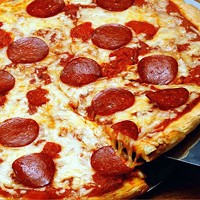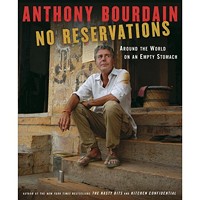Table Dancing
The world of food media has really taken off in the past few years. Emeril owns about half of New Orleans. "Molto" Mario Batali now hawks product at NASCAR races. Anthony Bourdain, that genius, has built an entire career out of being a pretty decent cook, a pretty decent looking guy, an unapologetic smoker, and willing to eat any weird foodstuff put in front of him. It'd be easy to knock all three of them.
However, truth is, they're all pretty interesting in their own way. Emeril, "BAM" his soul, got my parents to enjoy cooking shows and to add aged balsamic vinegar to their cupboards. Batali, for all his shilling, does make it a point to memorize more native Italian cuisines than anyone since Artie Bucco on The Sopranos. Bourdain? He helped add a bohemian flair to the world of food television, as well as regular reminders that the best food is often not served in places with fancy linens and silver.
The Food Network has grown along with them, and now it has as more buzz than Bourdain's blaze-happy kitchens boasted in his halcyon, pre-Kitchen Confidential days.
It's a shame, then, that food magazines seem so stuck in the world of Chef Tell. Editor Dana Cowin's Food and Wine, while commendable for featuring recipes that dare to contain less than 20 ingredients and that don't require Cordon Bleu credentials, nonetheless spends far too much time cozying up with celebrity chefs and bringing us all cutesy color pictures of the proceedings. Gourmet, since 1999 helmed by onetime New York Times head dining critic Ruth Reichl, seemingly forgets all Reichl's former daring in giving noodle houses and rib shacks -- you know, the places where most NYCitydwellers actually eat -- two- and three-star ratings, and instead features flowery (if fetching) tales of al fresco Tuscan picnics and grande gustatory getaways (thankfully, they contain a real lack of alliteration, which might explain why I've never penned anything for them).
Saveur? Well, that one's almost too good-looking for its own good. Saveur is the hottie you hated in high school, always color-coordinated and aware of her beauty. (Full disclosure: I've written for Saveur; hopefully, after this column, I still can!) The magazine is mostly full of good writing, but too often the features are vehicles for writers, such as the NY Times' R.W. "Johnny" Apple, to soak up and pontificate about, let's say, Sardinian cuisine while racking up outrageous expense budgets in the process. Such pieces are interesting, sure, but they're not about anything the average Whole Foods shopper is probably ever going to take part in.
For my money, most of the best food writing today is not done in so-called food magazines. Writers like GQ's Alan Richman (check out his new book, Fork it Over: The Intrepid Adventures of a Professional Eater, for a great introduction) and Esquire's John Mariani might not be everyone's cup of tea, but they possess real opinions, which may or may not laud the Next Big Thing chef or happening hotspot that just opened up in Tribeca. They pan out their lyrical camera to take in the whole of a restaurant: the service, the atmosphere, the gut feeling that often comes even before said gut is filled. They mix in enough sociological elements and personal asides to show us why this meal -- this story, at this time -- is important, and why the meal did (or didn't) work for them. Everyone's taste buds are different, after all. But you can get to know -- to trust -- another person's take on food.
Take the following excerpt from Fork it Over:
I am a restaurant critic. I eat for a living. Chefs complain about people like me. They argue that we are not qualified to do our jobs because we do not know how to cook. I tell them I'm not entirely pleased with the way they do their jobs, either, because they do not know how to eat. I have visited most of the best restaurants of the world, and they have not. I believe I know how to eat as well as any man alive ... A critic has to understand when food is correct, which is to be admired, and when it is inspired, which we would call a miracle. The job is part analysis (Is this good?), part self-analysis (It's good, but am I the only person who likes it?), and part gluttony (Have I tried everything on the menu?) ... I've never been a victim of culinary fatigue, because I can reverse direction and concentrate on the humble whenever I weary of the haute. A natural-casing hot dog off the grill can be as thrilling as Charlie Trotter's terrine of asparagus with goat cheese, beet juice, and hundred-year-old balsamic vinegar. I often make that point when it's my turn to pay.
In the space of about 100 words, we know this about Richman: He's contrary, he believes in himself, he's on the side of the eater (So important! Food isn't food unless it's eaten!), he understands the challenges of his job, he's able to admit when he's wrong, he's nothing approaching bourgeois, even as he can describe a Trotter terrine, and he, by God, likes to eat, and then, with the same hunger, write about it and share it with us all. He's got sense, but more importantly, he has a sense of humor.
After all, all this talk of food is only a matter of life or death when you don't have any to eat.
In two weeks: When does a thoroughfare become a destination? A look at Wilkinson Boulevard's timeless eateries.
Timothy C. Davis is an associate editor with Gravy, the official newsletter of the Southern Foodways Alliance. His food writing has appeared in Gastronomica, Saveur, the Christian Science Monitor, and the food Web site www.egullet.com. He may be contacted at timothycdavis1@gmail.com.
Speaking of 5.00000
-
A Family Affair
Dec 12, 2007 -

Darrell Roach
Dec 12, 2007 -
Body Talk
Dec 12, 2007 - More »
Latest in Table Dancing
More by Timothy C. Davis
-

Smoke This Issue: Eats
Apr 18, 2012 -
Joe Firstman tonight (Nov. 10) at The Evening Muse
Nov 10, 2010 -
Hot Rize tonight (Nov. 5) at McGlohon Theatre
Nov 5, 2010 - More »
Calendar
-

Haw River Wine Tasting @ Carolina Beer Temple.
-

Haw River Wine Tasting @ Carolina Beer Temple.
- Wed., April 24, 5-7 p.m.
-

TRIVIA THURSDAYS!!! @ Elizabeth Parlour Room
-

LIVE MUSIC FRIDAYS: TRACE CASANOVA @ Elizabeth Parlour Room at Hooligans FC
-

Charlotte Grilled Cheese Festival @ SouthEnd Station.
-
Three Questions for Barista Morgan Hopkins of Central Coffee
Java Master
-
How to build a brewery 1
It's not for the Mild
-
Braised Chicken with Shallots 2
I don't think I'll be making this again, but hey, if you like shallots more than a fat kid likes cake, then go for it.








